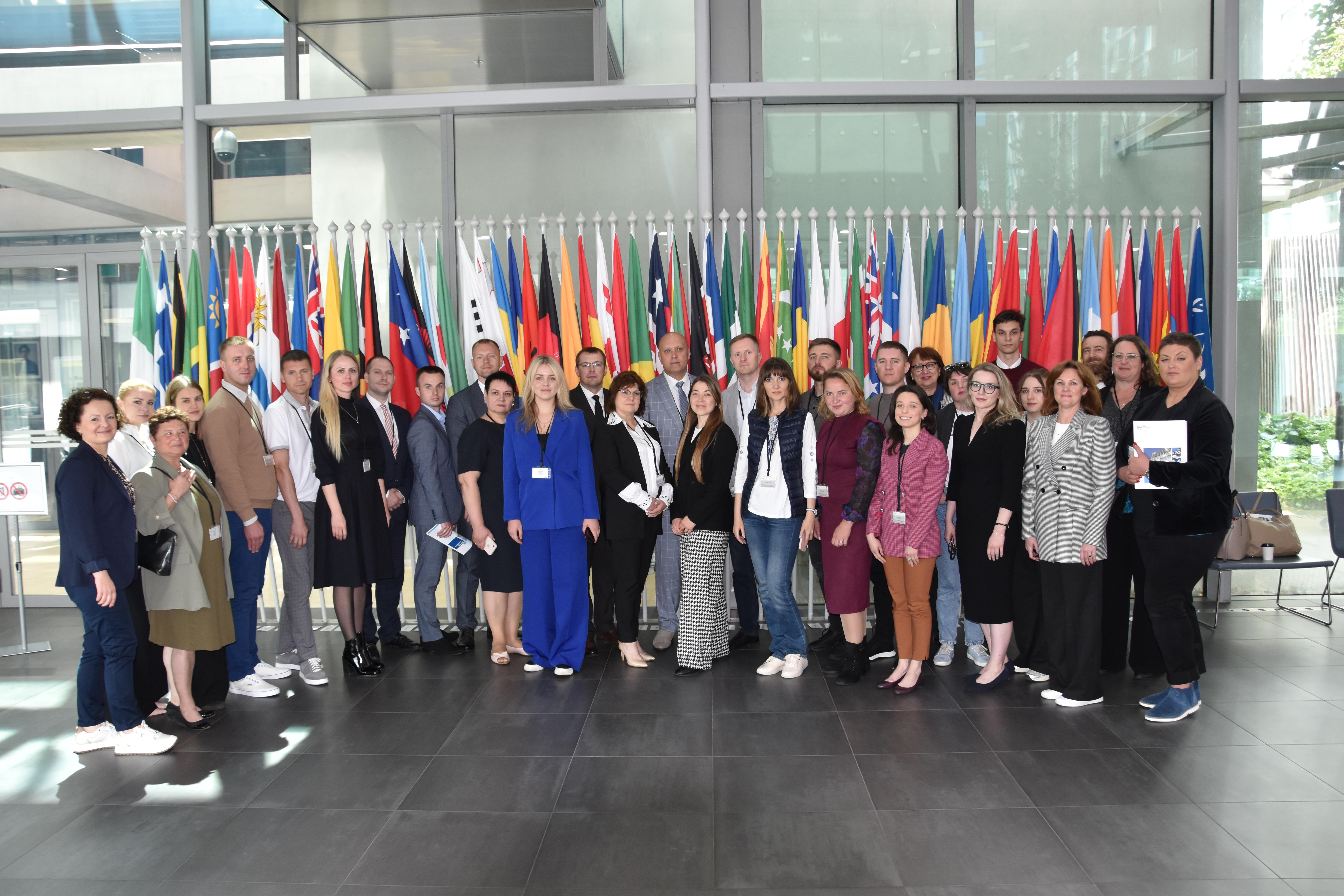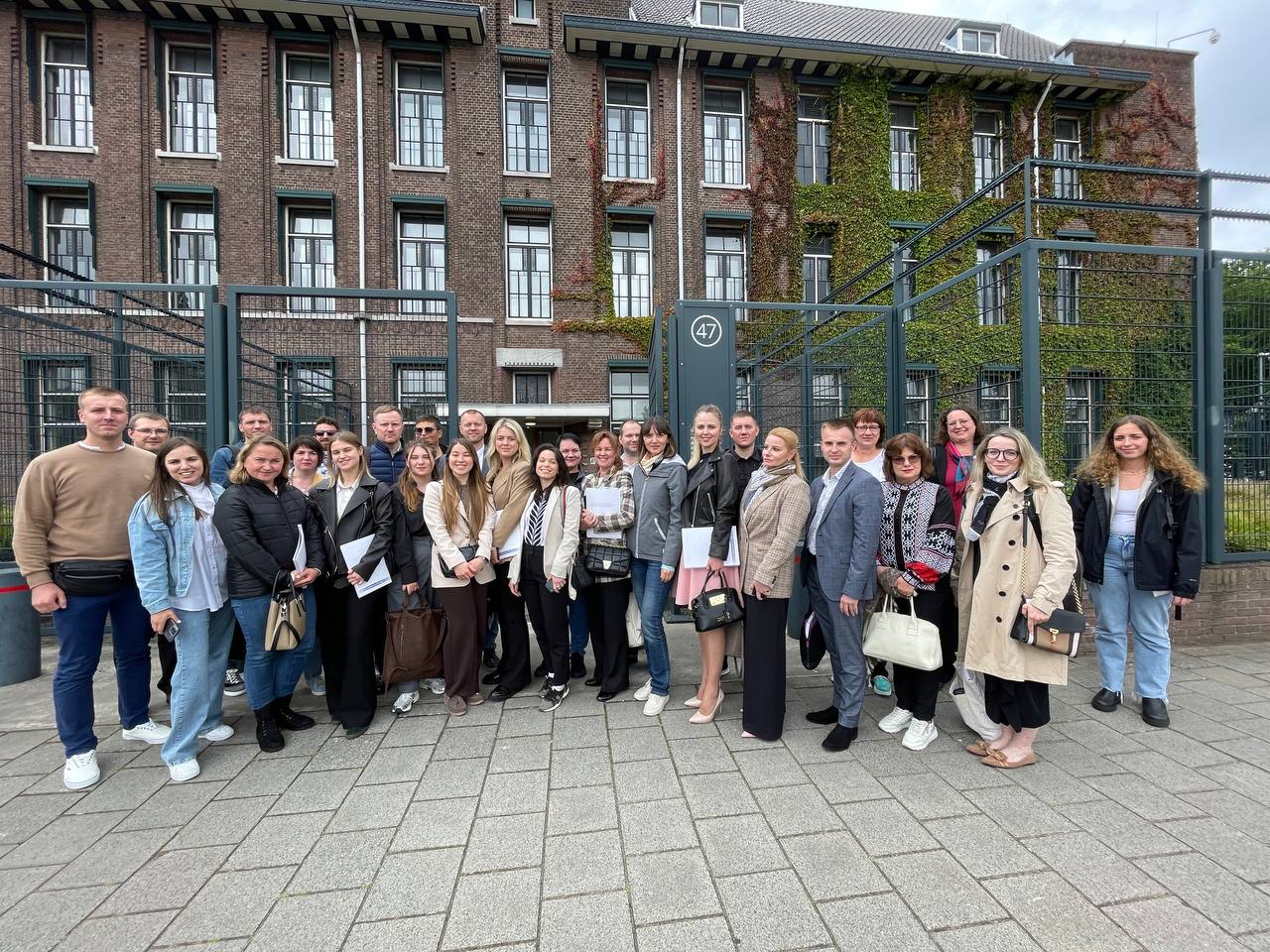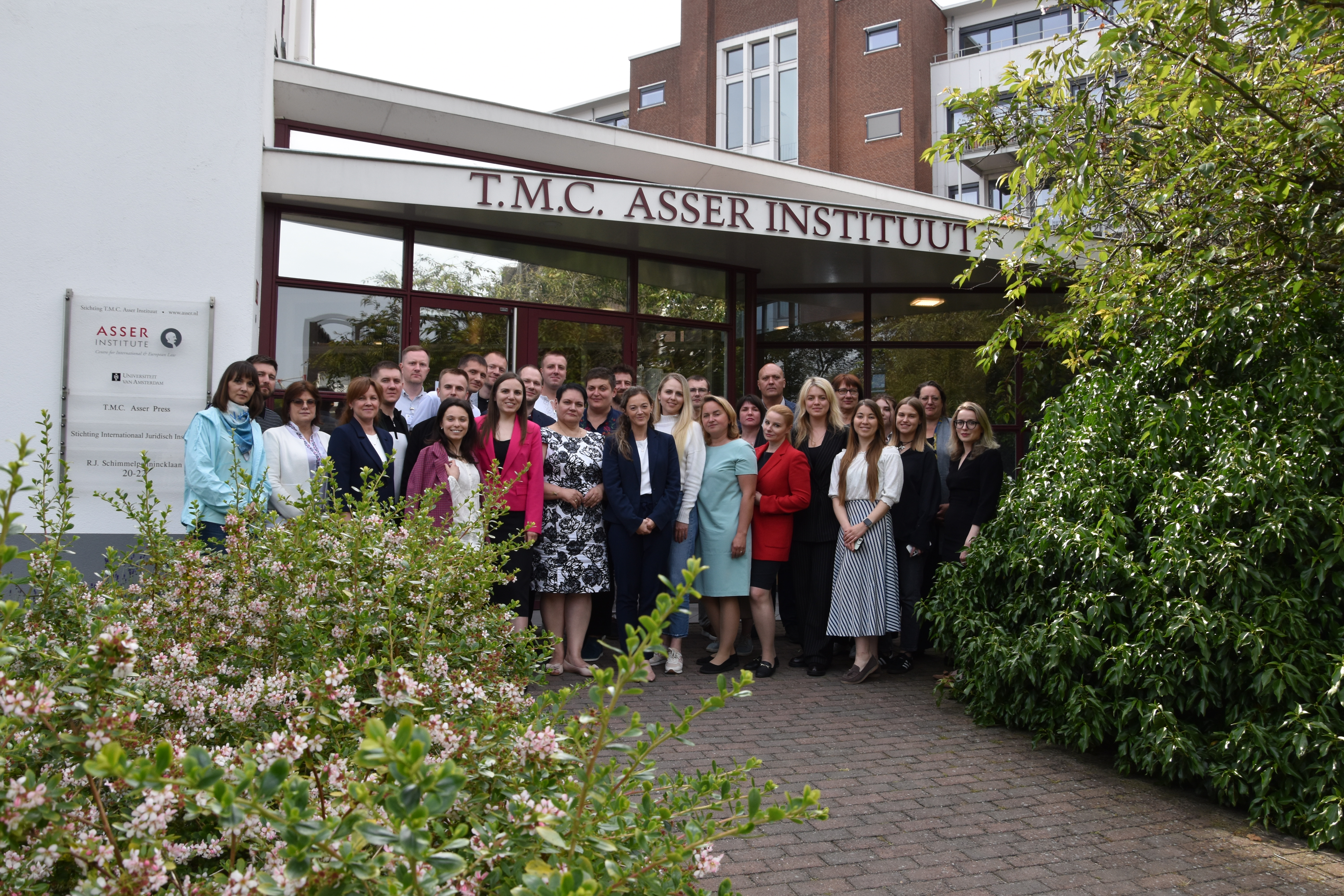Ukrainian lawyers visit The Hague to build capacity in international criminal justice
From June 11 to 14, a group of Ukrainian lawyers visited The Hague to participate in advanced training in international criminal law and justice.
The delegation consisted of 25 legal practitioners, including judges and prosecutors from different regions of Ukraine, Supreme Court judges, prosecutors from the Prosecutor General's Office, defense attorneys, and representatives of NGOs.
The visit was organized by the Ukrainian Bar Association within the framework of the project "Monitoring of War Crimes Trials", thanks to a grant agreement with the USAID Human Rights in Action Program, implemented by the Ukrainian Helsinki Human Rights Union (UHHRU). The project examines the observance of fair trial rights in comparison with international standards in order to outline best judicial practices and offer recommendations for addressing any shortcomings.
The study visit was organized in partnership with the International Bar Association (IBA) and the International Bar Association Human Rights Institute (IBAHRI), as well as in cooperation with the Asser Institute.

During the week, the participants visited international tribunals and institutions located in The Hague, including the International Criminal Court and the Register of Damage caused by the Russian aggression against Ukraine (more about the first day of the visit can be found here), Kosovo Specialist Chambers and Specialist Prosecutor's Office, European Union Agency for Criminal Justice Cooperation (Eurojust).
Sergiy Krupko, Deputy Head of the Department for Procedural Guidance in Criminal Proceedings of Investigators of the Territorial Department of the State Bureau of Investigation of the Chernihiv Regional Prosecutor's Office, comments on the visit to the International Criminal Court: "Direct communication with representatives of the ICC allowed us to gain new knowledge about the general activities of the court, its structure, jurisdiction and categories of cases. I would like to emphasize the opportunity to directly ask questions to a representative of the prosecutor's office and learn more about the procedure for collecting evidence in a case, its procedural registration, and presentation of evidence in court."
Anastasia Didenko, a lawyer, positively highlights the meeting with the ICC Victims and Witnesses Division: "It was valuable for me to hear about the experience and methods of work of international experts in order to avoid re-traumatization of victims, which I will try to further implement when working with victims."
Ukrainian judges also emphasize the positive aspects of visiting the ICC. "Meeting with representatives of the International Criminal Court and hearing their inspiring stories about their work will be a valuable resource for my professional activities, especially in connection with plans to create a special room for victims and witnesses in the court where I work," says Tetiana Vasylenko, judge of the Brovary City District Court in Kyiv Oblast.
"The program provided me with invaluable knowledge of the functioning of the International Criminal Court (ICC) and the process of prosecuting war crimes. Already during the first day, I was able to analyze the internal situation in Ukraine and assess the international support of our partners," said Yulia Shulyak, a lawyer.
"The new knowledge and observations gained will be useful in the course of procedural guidance of the pre-trial investigation, as well as in the trial of war crimes cases," summarizes the results of the visit to the ICC Andriy Mordvinov, prosecutor of the Department for Intergovernmental, State and Non-Governmental Organizations of the Department for Organizational, Methodological and Analytical Support of the Department for Combating Crimes Committed in the Context of Armed Conflict, Office of the Prosecutor General.
Mykhailo Odariuk, Deputy Chairman of the Irpin City Court of Kyiv Region, positively notes the meeting with the team of the Register of Damages: "The meeting with the representatives of the Register of Damages was of great practical benefit, allowing us to better understand the purpose of the Register, the categories of persons who can apply for compensation, the ways of filing applications, as well as the proper execution of documents for their successful consideration and inclusion in the Register. From a practical point of view, this meeting will help to effectively disseminate information on submitting applications to the Register in the future."
Yana Shestopalova, judge of the Irpin City Court of Kyiv region, adds: "Following the meeting with the team of the Register of Damages, we came to the conclusion that it is necessary to inform the citizens of the Bucha region affected by the aggression about the launch of the Register and the need to submit their applications to it. We will discuss the need to post information about the Register on the court's website."
The visit to the Kosovo Specialist Chambers and Specialist Prosecutor's Office was equally useful for the participants.

"I remember the visit to the Specialized Chambers and the Specialized Prosecutor's Office of Kosovo the most, because, in my opinion, international judicial practice on proving war crimes committed on the territory of Ukraine will have a similar development scenario, and in the near future we will witness the creation of a new international judicial institution for the administration of justice, which will involve leading experts from our country," shares his impressions Dmytro Bychenko, prosecutor of the Department for Combating Crimes Committed in the Context of Armed Conflict, Sumy Regional Prosecutor's Office.
Marta Zmysla, lawyer, emphasizes: "Ukraine is under armed aggression due to the full-scale invasion of Russia, and therefore the experience of the international tribunals for global international crimes is particularly valuable for us, as it will help us coordinate efforts to document and prosecute those who commit international crimes on the territory of Ukraine."
"The visit to the Specialized Chambers and the Specialized Prosecutor's Office of Kosovo was extremely useful, in particular, due to the information about the "inner workings" from the practitioners," comments Oleksandr Kukharuk, prosecutor of the Kyiv-Svyatoshyn District Prosecutor's Office of Kyiv Region (seconded to the Department for Combating Crimes Committed in the Context of Armed Conflict of the Kyiv Regional Prosecutor's Office).
Sergiy Krupko shares his impressions of the visit to Eurojust: "The visit to Eurojust and personal meetings with representatives of the International Center for the Prosecution of Crimes of Aggression provided an in-depth understanding of the work of the international body, its functions and objectives, and the possibility of interaction and exchange of evidence in cases of aggression. The consultations provided on future options for prosecuting and convicting high-ranking officials of the Russian Federation were a stimulating factor and support for the Ukrainian representatives who participated in the initial visit."
In addition to visits to institutions, the participants took part in training sessions on various aspects of international criminal processes designed to develop the capacity of participants to fight international crimes at the national level. The training focused on investigating, prosecuting and adjudicating war crimes cases, fair trial rights and the rights of the accused, including in absentia, gathering evidence from open sources, and the crime of genocide. Some of the trainings organized during the visit were conducted by the T.M.C. Asser Institute.
The morning presentation on the first day of the training was devoted to the problems of prosecuting war crimes in Ukraine. Carolyn Edgerton, an independent consultant and former prosecutor at the International Criminal Tribunal for the former Yugoslavia, shared her many years of experience in international criminal law. She spoke about the difficulties faced by national judicial systems in dealing with war crimes cases and emphasized the importance of adhering to international standards in these processes.
Carolyn Edgerton's speech was highly appreciated by the participants. In particular, Anastasia Didenko notes: "I would like to give a special mention to Carolyn Edgerton's lecture, which provided a thorough overview of the decisions with a detailed analysis of each case and evidence. She also emphasized the intent behind the crimes presented for discussion."
The next program included a presentation by Hannah Baghdasar, an OSINT (Open Source Intelligence) expert from the International Criminal Court. She has eight years of experience in digital investigations using open sources and has worked with organizations such as Bellingcat and the UN. Hannah emphasized the importance of using open sources to collect evidence in war crimes cases and shared useful techniques that can be implemented by Ukrainian specialists.
In the afternoon, Sarah Bafadel, an attorney at law from 9 Bedford Row, delivered a presentation on the issues of in absentia proceedings. She discussed the specifics of in absentia proceedings and provided practical recommendations for Ukrainian lawyers based on her extensive experience in international litigation, including the International Criminal Court and the Special Tribunal for Lebanon. Sara emphasized the importance of respecting human rights even in the difficult conditions of military conflicts.
Marie O'Leary, Acting Chief Counsel of the ICC Office of Public Counsel for the Defense, delivered a presentation on defense issues in war crimes proceedings in Ukraine. She emphasized the importance of ensuring a fair trial and presented cases from her practice.
The second day of the training began with a case study. Vitalii Sashchuk, Head of the Second Division of the Department for Organization of Procedural Management of Pre-trial Investigation and Support of Public Prosecution in Regional Prosecutor's Offices of the Department for Combating Crimes Committed in the Context of Armed Conflict, Office of the Prosecutor General, praised this format of interaction between the participants: "Working in groups allowed us to exchange useful experience with colleagues from different areas of legal activity."
Dmytro Bychenko adds: "This format provided an opportunity to establish closer communication between the participants of the training and encouraged the exchange of experience between representatives of different regions and professions, summarizing the knowledge already acquired and contributing to the analysis of Ukrainian legislation for compliance with international standards with the identification of problematic issues along the way."
However, most participants also noted that the time allotted for this task was insufficient, making it impossible for all participants to express their opinions and analyze the recommendations.
The next speaker was Annelot Jumele, a Dutch international crimes lawyer. Her presentation focused on practical aspects that lawyers can apply in their daily work to ensure impartiality and objectivity in trials.
The next topic was the preparation of court decisions, which was covered by Valerie Gabard and Asa Solway, experienced lawyers. They emphasized the importance of clarity and reasonableness in court decisions, stressing the importance of structuring arguments and evidence.
The day concluded with a presentation by Dr. Evelina Ochab, IBAHRI Program Associate, who addressed the complexities of understanding the crime of genocide. Her analysis of historical and contemporary examples of genocide gave the participants a deeper understanding of this heinous crime and emphasized the importance of professional training in combating it.
Olena Oliynyk, prosecutor of the Fourth Division of the Department for Procedural Guidance and Support of Public Prosecution of the Department for Combating Crimes Committed in the Context of Armed Conflict of the Office of the Prosecutor General, said: "The session was very useful and, in view of this, it is desirable to expand and deepen training on this topic, including with the involvement of practicing lawyers in the prosecution of the crime of genocide to discuss problematic practical aspects of this area of investigation."
Kateryna Pyshchyk, Project Manager at the Ukrainian Bar Association, emphasizes: "The training days of the study visit of the Ukrainian delegation were full of important discussions and provided the participants with an opportunity to gain valuable knowledge from leading international experts."
"In conclusion, I would like to note the informative and rich program of the study visit, as it allowed us to communicate with a large number of experts from various international organizations. Such study visits provide an exchange of experience and help to orient international colleagues to the problematic aspects of war crimes that we face in the course of pre-trial investigation and trial of crimes of this category," Artur Kotenko, prosecutor of the Izmail District Prosecutor's Office, shares his impressions of the visit.
Yulia Seheda, a lawyer, also praises the visit: "The study visit was positively different from standard training events, as it combined a theoretical block with visits to institutions that implement standards and develop practice in applying and interpreting international norms."
The knowledge and skills gained during the study visit will help Ukrainian lawyers improve war crimes trials in Ukraine, ensuring fair justice.

The Ukrainian Bar Association would like to express its gratitude to the International Bar Association (IBA) and the International Bar Association Human Rights Institute (IBAHRI) for their expert and technical assistance on international law and human rights issues and their continued support of Ukraine, as well as to T. M. C. Asser Institute for facilitating the visit.
_____
This publication is made possible by the generous support of the American people through the United States Agency for International Development (USAID) in the framework of the Human Rights in Action Program implemented by Ukrainian Helsinki Human Rights Union.
Opinions, conclusions and recommendations presented in this publication do not necessarily reflect the views of USAID, the United States Government. The contents are the responsibility of the authors.
USAID is the world’s premier international development agency and a catalytic actor driving development results. USAID’s work demonstrates American generosity, and promotes a path to recipient self-reliance and resilience, and advances U.S. national security and economic prosperity. USAID has partnered with Ukraine since 1992, providing more than $9 billion in assistance. USAID’s current strategic priorities include strengthening democracy and good governance, promoting economic development and energy security, improving health care systems, and mitigating the effects of the conflict in the east. For additional information about USAID in Ukraine, please call USAID’s Development Outreach and Communications Office at: +38 (044) 521-5753. You may also visit our website: http://www.usaid.gov/ukraine or our Facebook page at https://www.facebook.com/USAIDUkraine.
